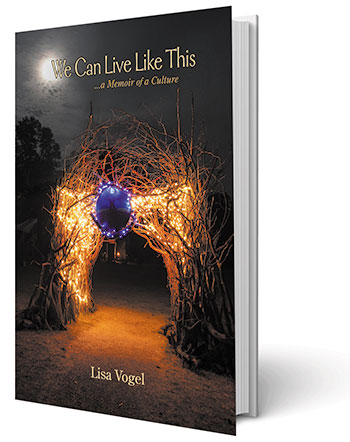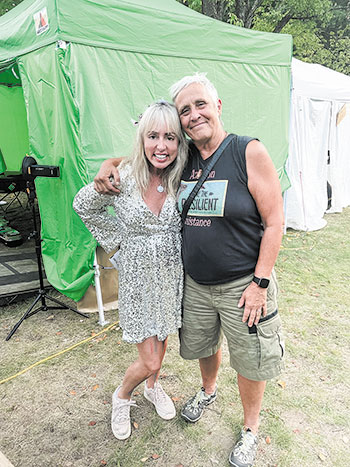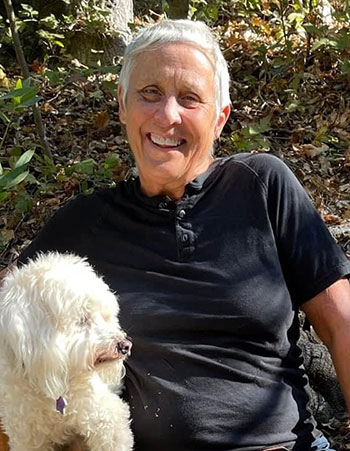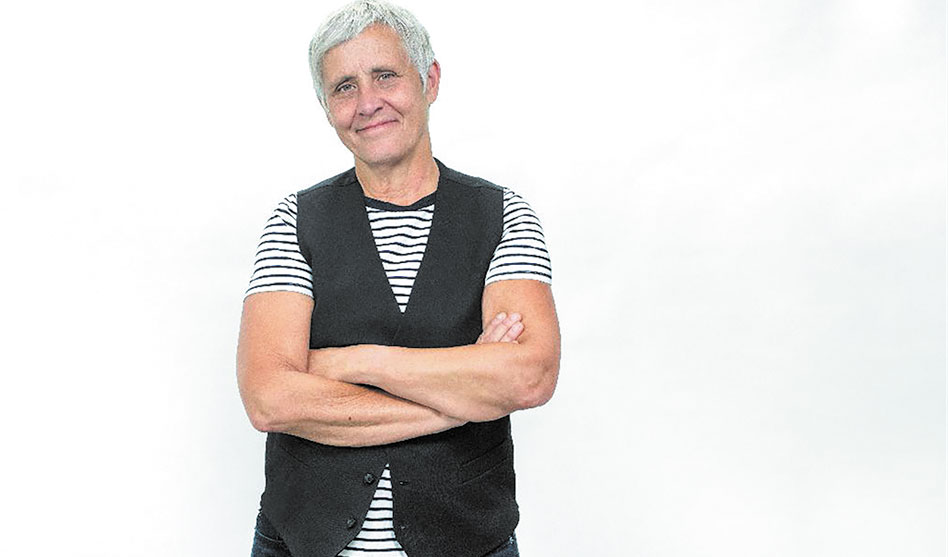Lisa Vogel
Michigan Womyn’s Music Festival founder Lisa Vogel relives history in ‘We Can Live Like This…’
JENNY BLOCK | Contributing Writer
JennyEBlock@icloud.com
No matter how you look at it, it was nothing short of magical: the “something out of nothing,” “how did we do this ourselves,” “why can’t life every day be like this” kind of magic that most of us only dream of.
 Held on a square mile of remote land surrounded by national forest, the Michigan Womyn’s Music Festival was a phenomenon for 40 years.
Held on a square mile of remote land surrounded by national forest, the Michigan Womyn’s Music Festival was a phenomenon for 40 years.
Founder Lisa Vogel was 19 years old when she envisioned the magical space for womyn on a property that came to be known as “The Land.”
A primitive three-day camping event grew into a massive annual festival with 8,500 women on site for the 20th anniversary. A hundred-plus artists, 450 crew members, 75-100 craftswomyn plus attendees all volunteered to help each year.
Womyn created it all, including four stages, more than 45 circus-style tents, eight wells, 40 electrical panels and two kitchens.
After Mich Fest ended, Vogel entered a long-term land contract to transfer ownership of the site to We Want the Land Coalition, a nonprofit organization now hosting programs on “The Land” throughout the summer.
Mich Fest may be no more. But the stories live on in Vogel’s new memoir, We Can Live Like This….a Memoir of a Culture. The book officially released on Aug. 5. Says Vogel, “I mean call me sentimental but…”
Dallas Voice caught up with Vogel to find out more about what readers can expect from We Can Live Like This…
Dallas Voice: Why write this book? Lisa Vogel: Well, I think a lot is misunderstood about the community of the festival. And I wrote the book, first and foremost, so that there would be a telling of the story of the women who created this thing out of nothing and taught ourselves all the ways of how to create a town, a very complex town, that could hold upwards of 8,000 people safely and thoughtfully.
And I wanted women that came after us, more than anything, to know that we did this, that it’s possible to do.

Author Jenny Block with Lisa Vogel on The Land
I think we think that you can’t create something out of nothing. But you don’t need to have funding, big funding. You don’t need to have a wealthy person. You don’t need to have engineers. You can actually just figure shit out.
Now, it was easier to just figure shit out in some ways in the ’70s when we started. But it doesn’t matter. I want to leave breadcrumbs for the people, for the women, who come behind us, because I think that creating space … I mean, it’s getting crazy town out there.
The world is crazy, and it is going to get crazier, and we’re going to need places of respite more than ever. And I think it’s also incredibly beautiful and important to be in the woods and to connect with the old ways, which is women and children in the woods together. That’s an old way.
So honestly, when I started with the book, I was just going to write a blog. I just want some of this stuff to be out there. There’s so much bullshit out there. So, I went into a class with Judy Grahn. She’s a working-class butch dyke and a very dynamic thinker.
So, I write Judy and say, “I’m a storyteller and I want to be able to write. I’m sitting around a campfire shooting the shit with a bunch of sisters, telling the stories about how we put all things together and stories about characters that were beloved to our community and I just really want to keep a colloquial working class tone. That’s what I want. Can you help me with that?”
And she said, send me some of your writing. And I sent her something I wrote, and she said, “Yeah, let’s do it.”
Dallas Voice: So what was the experience of writing this book like? I would really just try to think about some of the stories I literally would tell around the campfire early pre-fest or late post-fest or things that I thought were like cornerstones. Things people felt like were interesting.
And it illuminated the spirit of the festival. There’s a couple of stories in the book that kind of illuminate how people who are just not ever going to make it in the world lived a really honorable life on the land.
So, it just ended up being that each one was a story. And sometimes the story got so long that I broke it into two different stories. But that’s what my book ends up being — 40 stories.
And they relate to one another in that they roughly follow a timeline from 1976 to 2015. Every once in a while, I’ll dip back in one of the stories. I tell some things about my childhood, and I tell some things that didn’t necessarily happen on The Land but had to do with it.
So it’s not rigid in any way, but it’s kind of flows in this direction from the beginning to the end and to the realm of possibility of what comes next.

LV & Billied
Dallas Voice: Who do you imagine as the audience for We Can Live Like This…? The women who attended Mich Fest will recognize themselves because we created a community where we really felt seen and where we really felt supported by each other, taken care of — where we learned how to relate really deeply, relate to the woods as another being that we cared about.
All these things were pretty revolutionary for most people. And I would say the majority of people who came, the majority of women were urban women. It was a big deal for folks to learn to camp, love to camp, become one in the woods.
I think there will be also be the audience of people, younger women, women who were children during the festival, because there are so many daughters who came with generations and then adults who never made it, people who heard about it, people who heard great things, people who heard shitty things, people who were mad about it.
People maybe want to get the book and try to argue with it. All of that I think will have an interest, but definitely the women of the festival will feel like hopefully it will be their story. It’s my story, but hopefully, I mean, it is our story told in stories.
We’ll just see what happens. I am a 100 percent proud of my book. I’m good with who I am.
You can buy We Can Live Like This… from small, womyn-owned bookstores like BookWoman or online here. For more information, visit LisaAVogel.com.

